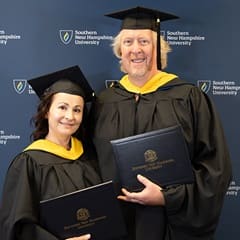What is an MS Degree?

Know before you read
At SNHU, we want to make sure you have the information you need to make decisions about your education and your future—no matter where you choose to go to school. That's why our informational articles may reference careers for which we do not offer academic programs, along with salary data for those careers. Cited projections do not guarantee actual salary or job growth.
Earning your bachelor's degree is an essential first step to becoming educated in your desired field, but you can take it further. Moving forward with a master's degree can help you gain a more specialized education and build a solid foundation for your career.
There are many types of master's degrees for you to explore when considering your options — like a Master of Science. Your desired field of interest will determine the type of master's program you should enroll in.
What Does MS Degree Stand For?

An MS degree, which stands for Master of Science, often focuses on technical and scientific areas while covering a wide array of skills and knowledge.
MS degrees are graduate degrees that contain different programs that fall under the science, technology, engineering and math (STEM) fields, as well as programs in business, social sciences and healthcare.
Some examples of MS degrees include:
- MS in Cybersecurity
- MS in Finance
- MS in Health Information Management
- MS in Organizational Leadership
Whether you want to work in accounting, cybersecurity or sports management, an MS degree can provide you with the knowledge and skills to problem solve, think critically and research while providing expertise in your field.
How Long is an MS Degree?
A bachelor's degree is normally 4 years and 120 credits, but how long is a master's degree? Master's programs typically take anywhere between 1 to 2 years to complete and vary between 30-60 credits, depending on your program.
When deciding on your master's degree, look into all of the options within an MS degree or a Master of Arts (MA) degree, which are generally the two broadest types of master's programs.
There are also more specialized master's programs, such as:
- Master of Business Administration (MBA)
- Master of Fine Arts (MFA)
- Master of Public Health (MPH)
The number of credits needed to complete each degree can vary. It's important to do your research to ensure you get the best education for your career goals.
Read more: How to Get a Master's Degree.
Which is Better, MA or MS?

There is no one master's program that is better than the other. It all depends on your field of study and the career you hope to advance in. The main difference between an MA and MS degree is while an MS degree focuses on more technical fields, like business and STEM, an MA degree focuses on the arts and humanities.
Your interests and goals will be the best indicator of what master's degree to get. For example, if you want to know what you can learn from data and make data-driven decisions, you might pursue an MS in Data Analytics. This degree can give you a more technical and hands-on approach to analyzing data and creating clear-cut data visuals with industry-standard tools.
If your goal is to become a writer, you may want to consider an MA in English and Creative Writing, taking a more theoretical approach to creating the foundational skills needed to be successful.
While both an MA and an MS have their benefits, one will be better for you and your goals. No matter the program, getting your degree can expand your knowledge and broaden your career opportunities, whether you intend to advance in your current career or pivot to a new one.
Read more: How to Choose a Graduate Program.

What Falls Under an MS Degree?
An MS degree covers a wide range of programs and prepares you for a number of top careers. It can also help you market yourself because it shows employers that you have knowledge in your chosen field.
Some examples of popular MS degree programs and their job outlooks include:
MS in Accounting
A master's in accounting can help you get ready for a career as an accountant, auditor, fraud examiner or financial analyst. An accountant's role is to prepare and review financial records for individual corporations. The specialized skills learned in your MS degree may give you advanced knowledge to better do your job.
According to the U.S. Bureau of Labor Statistics (BLS), the median annual wage for accountants and auditors was $81,680 in May 2024, with a projected 6% job growth from 2023 to 2033.*
Find out if a master's degree in accounting is worth it.
MS in Criminal Justice
During your master's in criminal justice program, you can gain the necessary skills in ethical leadership, business management and more. Whether you want to work for the federal, state or local government, or continue to advance in your law enforcement job, an MS degree can help take you to the next step.
Working in the criminal justice field is ever-changing and growing. Police and detective work is projected to grow 4% from 2023 through 2033, earning a median salary of $77,270 in 2024, according to BLS.*
Learn more about what you can do with a master's in criminal justice.
MS in Human Resources Management
Human resources management is a vital role at any company. Obtaining your master's in human resources management can provide you with the soft skills needed in your field. The program is designed to help you learn creative problem-solving skills, management skills, decision-making skills and how to work from an empathic and ethical standpoint.
In 2024, human resources managers earned a median salary of $140,030, with 6% job growth projected through 2033, according to BLS.*
Learn more about how to become a human resources manager.
MS in Information Technology
The world of information technology is constantly evolving and is needed in every industry. A master's in information technology can prepare you to identify and implement technologies to provide competitive differentiators for organizations, making you more marketable in your career.
The median earnings for people working in IT roles were $105,990 in 2024, according to BLS.*
Discover the different types of IT jobs.
MS in Psychology
Whether your career goal is to become a therapist, psychologist or professor, you can attain real-world perspectives during your master's in psychology. This degree can provide a deeper and more technical understanding of different forms of psychology, learning theories and ethical practices.
In 2024, psychologists earned a median salary of $94,310, with 7% job growth through 2033, according to BLS.*
Learn more about what you can do with a master's in psychology.
Find Your Program
Employment in jobs with a typical entry-level education of a master's degree is expected to grow by 12.1% from 2023 to 2033, according to BLS.*
A master's degree can also increase your earning potential.* According to BLS, the median weekly wage in 2024 for full-time workers over 25 whose highest education level was a master's degree was $1,840, compared to $1,543 for those holding only a bachelor's degree.*
Is an MS Degree Right for Me?
If you're looking to accelerate your career growth and build a stronger foundation for achieving your long-term goals, a master's degree can be worth it. Specifically, an MS degree offers a deeper and more specialized education in the sciences compared to a BS degree.

Husband and wife, David and Irina Roach '24G, both earned an MS in Cybersecurity, completing their programs at the same time.
Although Irina already worked in cybersecurity, she often used what she was learning during her program while at work, even before finishing her degree.
"I do learn on the job a lot, but having that academic knowledge certainly helps," she said.
David decided to earn his MS degree because he wanted to get back into the cybersecurity realm after his previous company dissolved during the COVID-19 pandemic.
"I'm looking forward to using this to advance my career in the direction I want to go," he said.

For Gabriela Del Valle ’23G, earning a master's degree was both a personal milestone and a meaningful step toward her future.
As the first in her family to achieve this level of education, she’s using her MS in Psychology to work toward her goal of becoming a psychologist.
"I plan to go pursue my PsyD in Clinical Psychology or Counseling Psychology," she said. (Psychology doctorates are not currently offered at SNHU.)
Ultimately, her master’s degree isn’t just an achievement — it’s a critical steppingstone on the path to a doctorate and a career in the field.
Del Valle's story of ambition and purpose is one shared by many graduate students. Jessica Yonice Vazquez ’24G, for example, pursued her MS in Human Resource Management with a deeply personal motivation.

"My overall goal was just to make sure that I was able to provide a future — a better future than I ever had — for my daughter as a single mother," she said.
And Vazquez is already putting her degree to work.
"I work for an admissions office at a community college in my hometown," she said. "I plan on applying my newly set skills to an HR department I am in."
There's a lot to consider if a master's degree is for you. You'll want to make sure the timing aligns with your personal and professional goals and that the degree offers the pacing you need.
Be sure to do your research by talking to an advisor, reviewing job descriptions and reviewing different programs' curricula to find the right degree and program for you.
A degree can change your life. Find the SNHU master's program that can best help you meet your goals.
*Cited job growth projections may not reflect local and/or short-term economic or job conditions and do not guarantee actual job growth. Actual salaries and/or earning potential may be the result of a combination of factors including, but not limited to: years of experience, industry of employment, geographic location, and worker skill.
Alexa Gustavsen ’21 is a content marketing specialist and writer at Southern New Hampshire University. Based in New Hampshire, she completed her bachelor's in creative writing and English on campus at SNHU. Currently, she is pursuing her master's in marketing online at the university. Connect with her on LinkedIn.
Explore more content like this article

Associate Degree vs. Bachelor's Degree: What's the Difference?

How to Get a Scholarship (And Why It Matters If You Do)

What is Tuition Reimbursement? The Often-Overlooked Employee Benefit
About Southern New Hampshire University

SNHU is a nonprofit, accredited university with a mission to make high-quality education more accessible and affordable for everyone.
Founded in 1932, and online since 1995, we’ve helped countless students reach their goals with flexible, career-focused programs. Our 300-acre campus in Manchester, NH is home to over 3,000 students, and we serve over 135,000 students online. Visit our about SNHU page to learn more about our mission, accreditations, leadership team, national recognitions and awards.


